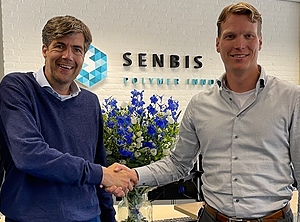BIOPLASTICS
Paques Biomaterials, Senbis Polymer Innovations to produce ‘game-changing' biopolymer
 Paques Biomaterials MD Joost Paques (l.) and Senbis MD Gerard Nijhoving (Photo: Paques Biomaterials) |
Two Dutch firms have teamed up to develop applications for a new biopolymer, which, they claim, can do away with the need for fossil fuel-derived polymers and has “all the advantages of plastics but without its disadvantages”.
Biopolymer specialist Paques Biomaterials (Balk; www.paquesbiomaterials.nl) and research group and sustainable plastics developer Senbis Polymer Innovations (Emmen; www.senbis.com) have joined forces and expect to soon produce what they are labelling a high-quality alternative to fossil plastics.
Related: LG Chem, Gevo to develop bio-based feedstocks
Gerard Nijhoving, managing director of Senbis, said his firm would help Paques Biomaterials develop different PHA grades suitable for a wide range of applications. “Paques Biomaterials develops the PHA, but we give direction on which way it must be developed, and then evaluate it.”
Nijhoving said Paques Biomaterials’ biopolymer, called Caleyda, was biobased and “highly biodegradable” in all environments. “Their product is unique because it is made from waste streams and doesn’t use genetically modified bacteria. That makes it sustainable and natural on all sides,” he added.
Biopolymer specialist Paques Biomaterials (Balk; www.paquesbiomaterials.nl) and research group and sustainable plastics developer Senbis Polymer Innovations (Emmen; www.senbis.com) have joined forces and expect to soon produce what they are labelling a high-quality alternative to fossil plastics.
Related: LG Chem, Gevo to develop bio-based feedstocks
Gerard Nijhoving, managing director of Senbis, said his firm would help Paques Biomaterials develop different PHA grades suitable for a wide range of applications. “Paques Biomaterials develops the PHA, but we give direction on which way it must be developed, and then evaluate it.”
Nijhoving said Paques Biomaterials’ biopolymer, called Caleyda, was biobased and “highly biodegradable” in all environments. “Their product is unique because it is made from waste streams and doesn’t use genetically modified bacteria. That makes it sustainable and natural on all sides,” he added.
05.07.2023 Plasteurope.com [253153-0]
Published on 05.07.2023
